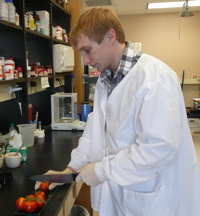Biology Junior on Research Roll
UALR junior Ryne Ramaker of Bentonville launches a new research project this semester aimed at developing an efficient method for determining antioxidant properties of tomato varieties.
His work with Dr. Stephen C. Grace, associate professor of biology – “Evaluation of antioxidant phytonutrient composition in tomato varieties of commercial importance to Arkansas” – is being funded by a grant of the Arkansas Student Undergraduate Research Fellowship (SURF).
The goal of the project is to develop a rapid and efficient method for determining metabolite concentrations and antioxidant properties of important tomato varieties. He has also received funding from UALR’s Graduate School to support his research.
Ramaker begins the spring semester at UALR on a roll, following an outstandingly successful previous eight months.
A 2008 graduate of Bentonville High School, Ramaker is a junior biology-chemistry double major. He is a member of the University Science Scholars Program and the Donaghey Scholars Program.
“After graduation, I plan on attending some form of graduate school to prepare me for a career in research,” he said. “I am still in the process of narrowing down exactly what kind of work I would like to do.”
This past summer he was one of only 10 undergraduate students selected to participate in an undergraduate research program at the University of Alabama at Birmingham’s School of Medicine.
During his internship, Ramaker worked with UAB’s director of cancer research, Dr. Boris Pasche, on a ground-breaking cancer therapy. The therapy consists of a series of finely tuned, cancer-specific electromagnetic fields administered in an entirely non-toxic and non-invasive manner.
Ramaker’s work involved uncovering the mechanism of action of this new treatment before Phase III clinical trials were conducted. Specifically, he worked with hepatocellular carcinoma, a form of liver cancer common in South America and Africa. Because many of the afflicted people are poor, an inexpensive, easily disseminated treatment is sorely needed.
Ramaker has presented his results at conferences in Arkansas and Alabama, where he won first place for biology research at UAB’s Summer Undergraduate Research Conference. He also won Arkansas’s Idea Network of Biomedical Research Excellence – INBRE – and second place at the International BioNanoTox Symposium in Little Rock.
The results of his work, along with results from other members of Pasche’s lab, are in the process of being submitted to a major scientific journal.